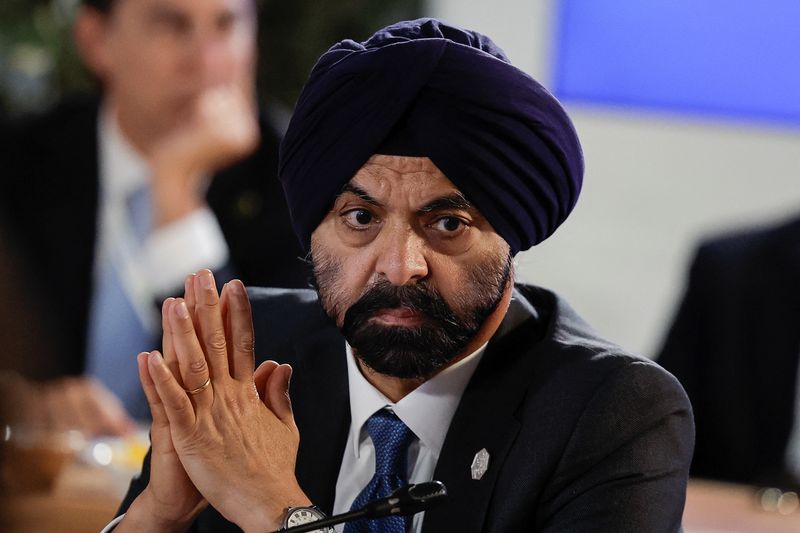By Andrea Shalal and David Lawder
WASHINGTON (Reuters) -The World Bank voted on Tuesday to change its internal lending guidelines, freeing up $30 billion in additional lending capacity over the next decade to help developing countries and emerging markets grapple with climate change and other global challenges, World Bank President Ajay Banga told Reuters NEXT.
Banga said the bank's International Bank for Reconstruction and Development (IBRD) arm would lower its equity-to-lending ratio by 1 percentage point to 18%, taking on a bit more risk, as it continues to implement reforms outlined in an independent report prepared for the Group of 20 (G20) major economies and demanded by its shareholders, including the United States.
The move, coupled with changes in the bank's pricing policies, means the bank will be increasing its lending capacity by a total of $150 billion over the next seven to 10 years through adjustments to its balance sheet, Banga said in a Reuters NEXT Newsmaker interview.
The changes come at a time of mounting global challenges such as the war in Ukraine, escalating violence in the Middle East, worsening climate disasters and massive government debt levels. Banga said one of the biggest looming crises was an expected gap of nearly 800 million jobs for the 1.2 billion people that would reach working-age over the next 10 years.
Some experts estimate developing countries and emerging markets will need at least $3 trillion in funding annually to address future pandemics, climate change and other challenges.
The IBRD last changed its equity-to-lending ratio in 2023, dropping it to 19% from 20%.
"We have got board approval today to change our equity-to-loan ratio down by another one percentage point, meaning it frees up capacity in our balance sheet to lend more," Banga said. Asked if further adjustments were possible, Banga said the bank would keep looking at new instruments such as hybrid capital and ways to optimize its balance sheet.
The bank said it was able to reduce the ratio while safeguarding its triple-A rating by strengthening its credit rating monitoring system and adding contingency measures if a "stress event" should occur.
The board also approved changes in its fee structure to make it easier for borrowing countries to get loans and then make them cheaper to repay, including discounted pricing for short maturity, seven-year loans and extending IBRD's lowest pricing to more vulnerable small states, the bank said in a statement.
Banga said the World Bank was also pushing to replenish the lender's fund for the world's poorest countries, the International Development Association (IDA), by more than $100 billion, adding that it was realistic to aim for $120 billion, as some African and Caribbean leaders have suggested.
"If we get to $120 billion, that would be outstanding, that's what we're working on," he said.
To reach that total, World Bank shareholders and donor countries would have to boost their contributions from $24 billion to $30 billion, which would be a challenge given the rise of the U.S. dollar and domestic fiscal challenges.
"We're fighting really hard to get through this," he said, noting that Denmark had already announced a 40% increase in its contribution and other countries including Britain and Spain were considering increases.
He said he was reasonably optimistic that the United States, the world's largest economy, would also contribute "a good number," but gave no details.
Banga said he would meet with U.S. Treasury Secretary Janet Yellen, who spearheaded calls for the World Bank to evolve its work to meet current needs before Banga came to the bank.
"By and large, she's very supportive of the things we've done on the evolution framework as a team," he said, noting that the bank was also working to reduce the time it took to move from proposal to board approval of new projects.

It had been taking the bank an average of 19 months to move from proposal to approval, but that was now down to 16 months and "headed toward 12," he said, adding that some projects were already being approved in under a year.
Banga said a new job council he created to address the jobs crisis, to be headed by Singapore President Tharman Shanmugaratnam and former Chilean president Michelle Bachelet, would meet for the first time during next week's annual meetings of the International Monetary Fund and the World Bank.